
The current political regime in Angola is presidentialism, in which the President of the Republic is also head of state and government; it is advised by a Council of Ministers, which together with the President form the national executive power. Legislative power rests with the 220 parliamentarians elected to the National Assembly. The President of the Republic, together with the parliament, appoints the majority of the members of the two highest bodies of the judiciary, that is, the Constitutional Court and the Supreme Court. The judiciary is still made up of the Court of Auditors and the Supreme Military Court.
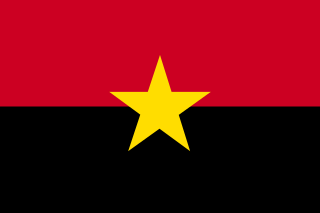
The People's Movement for the Liberation of Angola, for some years called the People's Movement for the Liberation of Angola – Labour Party, is an Angolan social democratic political party. The MPLA fought against the Portuguese Army in the Angolan War of Independence from 1961 to 1974, and defeated the National Union for the Total Independence of Angola (UNITA) and the National Liberation Front of Angola (FNLA) in the Angolan Civil War. The party has ruled Angola since the country's independence from Portugal in 1975, being the de facto government throughout the civil war and continuing to rule afterwards.

The president of Angola is both head of state and head of government in Angola. According to the constitution adopted in 2010, the post of prime minister is abolished; executive authority belongs to the president who has also a degree of legislative power, as he can govern by decree.
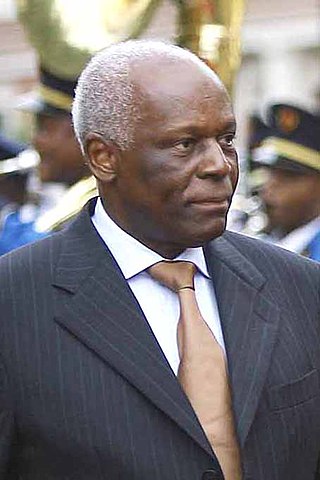
José Eduardo dos Santos was the president of Angola from 1979 to 2017. As president, dos Santos was also the commander-in-chief of the Angolan Armed Forces (FAA) and president of the People's Movement for the Liberation of Angola (MPLA), the party that has ruled Angola since it won independence in 1975. He was the second-longest-serving president in Africa, surpassed only by Teodoro Obiang Nguema Mbasogo of Equatorial Guinea.

Fernando da Piedade Dias dos Santos, known as Nandó, is an Angolan politician who was the first vice president of Angola from February 2010 to September 2012. He was the prime minister of Angola from 2002 to 2008 and president of the National Assembly of Angola from 2008 to 2010. He has again served as president of the National Assembly from 2012 to 2022.

Elections in Angola take place within the framework of a multi-party democracy. The National Assembly is directly elected by voters, while the leader of the party or coalition with the most seats in the National Assembly automatically becomes President.

The National Assembly is the legislative branch of the government of Angola. Angola is a unicameral country so the National Assembly is the only legislative chamber at the national level.
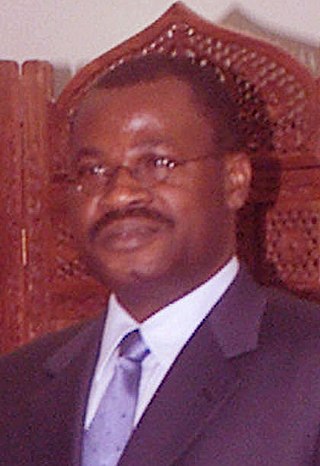
João Bernardo de Miranda is an Angolan politician who is currently the Ambassador of Angola in France. He was Minister of External Relations of Angola from January 1999 to October 2008 and the Governor of Bengo Province from 2009 to 2018.
Lúcio Rodrigo Leite Barreto de Lara, also known by the pseudonym Tchiweka, was a physicist-mathematician, politician, professor, anti-colonial ideologist and one of the founding members of the Popular Movement for the Liberation of Angola (MPLA). He served as General Secretary of the MPLA during the Angolan War of Independence and Angolan Civil War. Lara, a founding member of the MPLA, led the first MPLA members into Luanda on November 8, 1974. He swore in Agostinho Neto as the first president of the country.

Parliamentary elections were held in Angola on 5 and 6 September 2008, as announced by President José Eduardo dos Santos on 27 December 2007. They were the first since the 1992 general elections, which had led to the outbreak of the second phase of the Angolan Civil War, which continued until 2002.
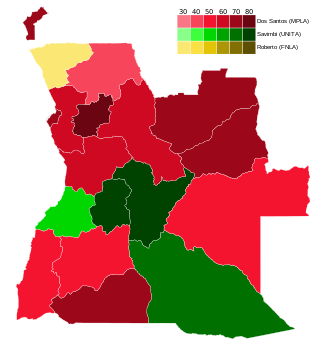
General elections were held in Angola on 29 and 30 September 1992 to elect a President and National Assembly, the first time free and multi-party elections had been held in the country. They followed the signing of the Bicesse Accord on 31 May 1991 in an attempt to end the 17-year-long civil war. Voter turnout was 91.3% for the parliamentary election and 91.2% for the presidential election.

Since its independence from Portugal in 1975, Angola has had three constitutions. The first came into force in 1975 as an "interim" measure; the second was approved in a 1992 referendum, and the third one was instituted in 2010.
In the Angola–Cuba Declaration of 1984, signed 19 March 1984 in Havana by president José Eduardo dos Santos of Angola and Fidel Castro, premier of Cuba, the two countries agreed to the withdrawal of Cuban forces from Angola after the withdrawal of South African troops from Angola and Namibia, and after UN-Security Council resolution 435 on Namibian independence was strictly applied.

Parliamentary elections were held in Angola in 1980, the first elections following independence from Portugal in 1975. The country was a one-party state, with the People's Movement for the Liberation of Angola – Labour Party (MPLA-PT) as the sole legal party. Non-party candidates were vetted to ensure that they were not elected to the colleges. As a result, all 229 elected MPs were from the MPLA–PT.
The Republican Party of Angola - Conservative Party is an anti-corruption political party in Angola that strongly opposes the Popular Movement for the Liberation of Angola (MPLA), which has ruled the country since 1975.

General elections were held in Angola on 31 August 2012 to elect the President and National Assembly. During campaigning, the opposition UNITA and its offshoot CASA-CE accused and criticised the government of corruption and called for greater transparency; this also led to protests and arrests the day before the election. These were the first elections after the new 2010 constitution was instituted.

General elections were held in Angola on 23 August 2017 to elect the President and National Assembly, although voting was delayed until 26 August at 15 polling stations due to bad weather on election day. The top candidate of the winning party is elected president. The ruling party MPLA headed by João Lourenço was widely expected to win. Preliminary results show that MPLA won with a clear margin. The final results were released on 6 September 2017.
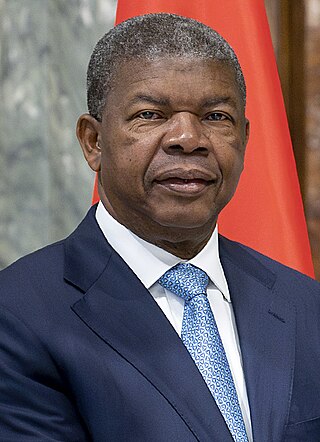
João Manuel Gonçalves Lourenço is an Angolan politician who has served as the 3rd president of Angola since 26 September 2017. Previously, he was Minister of Defence from 2014 to 2017. In September 2018, he became the Chairman of the People's Movement for the Liberation of Angola (MPLA), the ruling party. He was the party's Secretary-General from 1998 to 2003.

General elections were held in Angola on 24 August 2022 to elect the President and National Assembly. Incumbent president João Lourenço was eligible for one more term. The MPLA was re-elected with a reduced majority, winning 124 seats with 51% of the vote. The main opposition party, UNITA won 90 seats with 44% of the vote. The Social Renewal Party (PRS), the National Liberation Front of Angola (FNLA) and the Humanist Party of Angola (PHA) each won two seats. The elections were the closest in Angolan history between the MPLA and UNITA.















